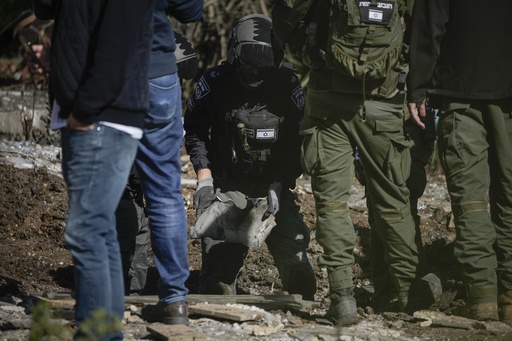BEIRUT — Israeli military aircraft launched strikes on structures in the suburbs of Beirut and the southern Lebanese city on Tuesday, as the Israeli security Cabinet gathered to discuss a ceasefire proposal mediated by the U.S. to bring an end to over a year of hostilities with Hezbollah.
Growing optimism surrounds the proposal, which suggests an initial two-month cessation of hostilities, requiring Hezbollah to withdraw its armed presence from a significant area in southern Lebanon, while Israeli forces would retreat to their own territory.
The Israeli security Cabinet convened on Tuesday afternoon and was anticipated to endorse the plan, which Lebanese representatives have indicated Hezbollah is also in favor of.
One of the contentious issues has been Israel’s insistence on retaining the right to respond militarily if Hezbollah fails to uphold its obligations. The outlined agreement would see thousands of Lebanese troops and U.N. peacekeeping forces deployed in southern Lebanon, with compliance monitored by an international committee led by the United States.
Israel’s Defense Minister, Israel Katz, stated that military action against Hezbollah would occur if the U.N. peacekeeping force, known as UNIFIL, does not effectively enforce the terms of the agreement.
“If you don’t act, we will act, and with great force,” Katz declared during discussions with U.N. special envoy Jeanine Hennis-Plasschaert.
The European Union’s chief diplomat, Josep Borrell, noted that Israel’s security concerns had been addressed within the U.S.-French mediated proposal.
“No excuse for not implementing a ceasefire exists. Otherwise, Lebanon will collapse,” Borrell informed the media in Fiuggi, Italy, on the fringes of a Group of Seven meeting, adding that the U.S. would lead a committee for ceasefire implementation, with France joining at Lebanon’s request.
Despite the increasing optimism from Israeli, U.S., Lebanese, and international officials about a ceasefire, Israeli assaults in Lebanon persist, targeting what the nation claims is the need to undermine Hezbollah’s military capability.
On Tuesday, Israeli jets attacked at least six sites in the southern suburbs of Beirut, with one strike occurring near Lebanon’s sole airport, generating significant smoke clouds. Fortunately, there were no immediate reports of injuries.
The airport has remained operational despite its proximity to congested suburbs associated with Hezbollah’s activities.
Further strikes occurred in Tyre, where the Israeli military reported the elimination of a Hezbollah commander.
Additionally, the Israeli forces claimed their ground troops advanced into parts of Lebanon’s Litani River, a crucial area in the context of the impending ceasefire.
They reported engaging in clashes with Hezbollah and destroying rocket-launching sites in the Slouqi region, located just a few kilometers from the border.
Under the proposed ceasefire terms, Hezbollah would have to relocate its forces north of the Litani River, approximately 30 kilometers from the Israeli border in some areas.
Achieving a ceasefire between Israel and Hezbollah—considered the most potent Iranian-backed entity in the region—could significantly ease existing tensions that have raised fears of a wider war involving Israel and Iran. However, it remains uncertain how the ceasefire will influence the ongoing conflict between Israel and Hamas in Gaza. Hezbollah had previously stated it would not accept a ceasefire until the Gaza situation was resolved but eventually abandoned this condition.
Following the onset of war triggered by Hamas’s October 7, 2023, assault on southern Israel, Hezbollah intensified its fire into northern Israel as a demonstration of solidarity with the Palestinians. Israel retaliated, and both sides have been in continuous conflict since.
In early September, Israel raised the intensity of its military operations, deploying forces into Lebanon with the commitment to suppress Hezbollah attacks.
Lebanese health officials report that over 3,760 individuals have died due to Israeli strikes in Lebanon over the past 13 months, many of whom are civilians. This ongoing bombardment has displaced 1.2 million people from their homes. Israel claims to have killed more than 2,000 Hezbollah fighters.
Meanwhile, Hezbollah’s attacks have displaced about 50,000 residents in northern Israel, with its rockets reaching as far south as Tel Aviv, resulting in at least 75 fatalities, primarily among civilians. Moreover, over 50 Israeli soldiers have died amid the ground offensive in Lebanon.
After previous ceasefire discussions failed to materialize, U.S. officials advised caution, stressing that negotiations remain ongoing and that last-minute complications could either delay or derail an agreement.
“Nothing is done until everything is finalized,” commented John Kirby, White House national security spokesperson.
While it seems likely that the ceasefire proposal will receive approval if Prime Minister Netanyahu puts it to a vote in his security Cabinet, one hardline member, National Security Minister Itamar Ben-Gvir, has expressed his opposition. He stated on X that an agreement with Lebanon would represent a “significant mistake” and a “lost historic opportunity to eliminate Hezbollah.”
